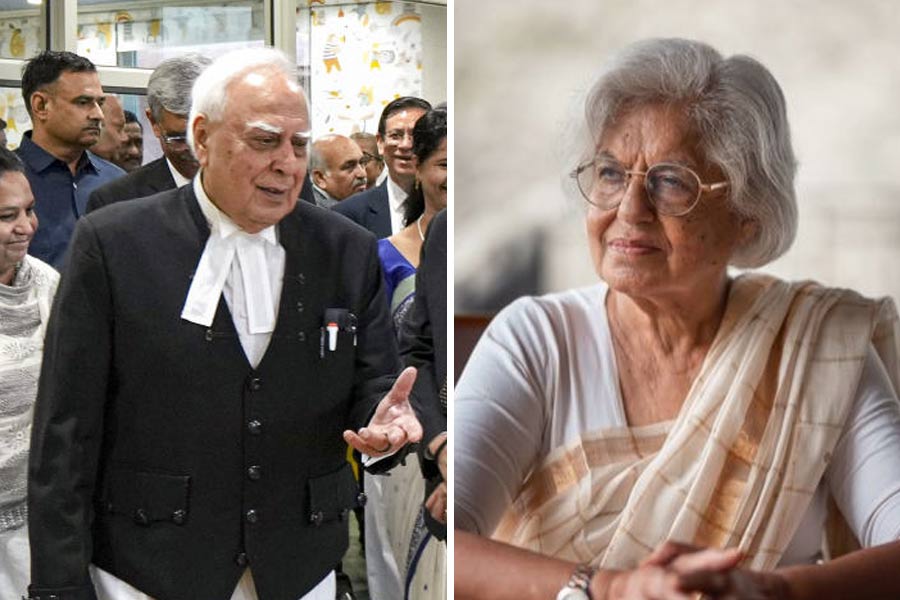Two of India’s most high-profile lawyers starred in the courtroom hearing that most of Bengal was glued to on Tuesday.
Senior advocate Indira Jaising, appearing on behalf of the junior doctors in front of the three-member division bench led by the Chief Justice of India D.Y. Chandrachud, said the Mamata Banerjee government should not be in denial.
She accused the state’s counsel, senior advocate Kapil Sibal, of “demonising” the doctors who have ceased work since the rape and murder of their colleague at the state-run RG Kar Medical College and Hospital in Calcutta on August 9.
Jaising told the apex court that she had appeared before the bench to build confidence between the state and the junior doctors and wanted the medics to get back to work.
During Tuesday’s hearing, while the CJI was dictating the order from the bench, Sibal pointed out that the junior doctors had said they would get back on whether they would resume work or not.
At this point Jaising intervened: “Milord, I am here to address the issue, if he has the patience to listen.”
She immediately apologised: “I am sorry. I am sorry, milord. I got carried away. My apologies to Mr Sibal.”
In their prayer, the junior doctors’ sought the formation of a broad-based monitoring committee in each hospital having administrative, academics, nurses, doctors and other healthcare staff etc; formulation of a confidential grievance redress system at the hospitals for the students, doctors; formation of internal complaint committees in accordance with the law; setting up counselling centres at every hospital with qualified professionals, particularly the psychiatric and psychology departments, to deal with the stress faced by doctors in course of their duties.
“Existing committees are already there,” Sibal said.
Jaising argued: “This incident would not have happened if these were put in place. Let them not be in denial, that is our only demand. We have no other demand, milord. Don’t be in denial.”
“We are not denying it,” Sibal replied.
“Can you make that statement that the committees are in place? Can you put your hand on your heart and say,” Jaising asked back.
Sibal replied: “Yes they are there.”
“I am saying they are not there,” Jaising shot back.
Making her arguments before the apex court, Jaising said: “This court expressed an expectation that the junior doctors will return to work by September 5. Some of the pre-conditions have not been provided till today. Nevertheless, in the spirit of the order of this court, we agreed to a meeting. Forty of them met the chief minister yesterday. A settlement was reached last night. There are issues I would like to raise.”
The two were again involved in a verbal duel over the issue of the junior doctors resuming work.
“There are 10,000 of them and 3,000 senior doctors; 75 per cent of them are not reporting to work,” said Sibal.
Jaising retorted: “I was the one who raised [that] a settlement has been reached. He did not initiate this. Doctors cannot be demonised like this.”
She said the West Bengal Junior Doctors’ Front would hold a general body meeting to decide on the next course of action, but did not commit to a timeframe of when the meeting will be held and when the protesting doctors will resume work.
When Sibal tried to raise the junior doctors’ demand for live-streaming of the meeting with the chief minister, Jaising said: “We are satisfied with the meeting. This is not fair. Again he is trying to demonise the doctors. We went to the meeting without live-streaming.”
Incidentally, Indira Jaising was among the petitioners who enabled live-streaming of proceedings at the Supreme Court. When the hearing began on Tuesday, Sibal argued against the live-streaming of the RG Kar case proceedings, claiming female lawyers representing the state were being threatened with rape and that the reputation of the lawyers was being destroyed.
Jaising told the three-member bench that the administrative accountability over the incident at RG Kar Medical College and Hospital had to be fixed.
“There are statutes involved, like the West Bengal Health University Act, the West Bengal Medical Council Act. The three statutory bodies have to be held accountable. All of them had the responsibility to monitor,” she said.
Jaising said the junior doctors were afraid of going back to work because they believed those involved in the nexus were still roaming around.
“Rightly or wrongly, they believe so – that they are still roaming around. Protect us. That is all. There is a fear psychosis,” she repeatedly told the court.
When Sibal informed the CJI that the chief minister herself had assured no punitive action will be taken against the junior doctors who were on cease-work, Jaising asked: “What punitive action will be taken against those who did this to us?”
Jaising and Karuna Nundy, who was representing senior doctors, called for the dismantling of the force of 1,514 private guards that the state health department had decided on hiring on contract for security at state-run healthcare facilities.
“The 1,514 force requires to be dismantled. They are outside the law and they must be replaced by regular police force in the interest of safety and security,” Jaising said. “They are performing a policing function that cannot be performed by people who do not fulfil the role of police in West Bengal. We are asking for regular police.”
When Sibal was reading out the state’s affidavit on the “confidence building initiatives,” the opposite counsels, including Nandy and solicitor general Tushar Mehta, asked for copies to be provided to them.
“May I have a copy please? This concerns the junior doctors. Mr Sibal, may I have a copy? I have to address the court on this issue. What is the difficulty in sharing a copy with me?” Jaising asked.
“I am reading it to you,” said Sibal.
“You should have come to court with more copies,” Jaising answered back.
She finally had her copy.











